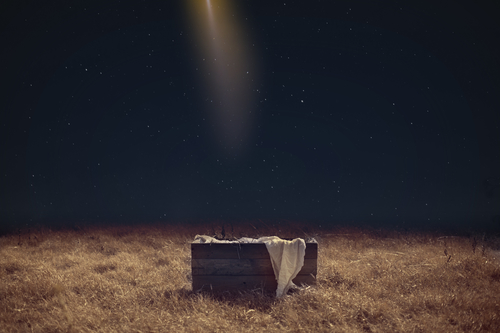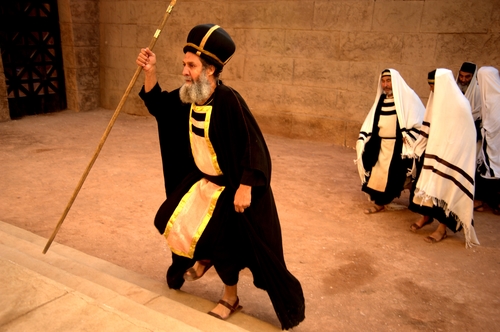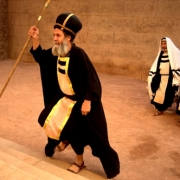One of the Worst Kings
/1 Comment/in Weekly Devotional/by David GuzikAlso he removed the Sabbath pavilion which they had built in the temple, and he removed the king’s outer entrance from the house of the LORD, on account of the king of Assyria. Now the rest of the acts of Ahaz which he did, are they not written in the book of the chronicles of the kings of Judah? (2 Kings 16:18-19)
Ahaz was one of the worst to reign over Jerusalem and the Kingdom of Judah. He brought in corrupt pagan innovations to the temple of God. Ahaz took away many of the good things that stood before. The record of 2 Kings 16 tells us some of the story, but not all of it – the rest of the acts of Ahaz are found in 2 Chronicles and a few other places.

Ahaz did what he could to discourage the worship of the true God at the temple of God. For a time, he even shut down the operation of the temple and established small pagan altars all around Judah (2 Chronicles 28:24-25).
I think that in many ways, Ahaz is a warning to our generation. He could be considered a church leader from the 21st century on several points.
– Ahaz was a man with an artistic sense of style.
– Ahaz was impressed with technology and brought the Babylonian innovation of the sundial to Jerusalem (2 Kings 20:11).
– Ahaz loved innovation and new things, and brought those innovations into worship.
– At the same time, Ahaz seemed to be a nice man. He did not have the persecuting spirit of his grandson Manasseh (2 Kings 21:16).
– Yet, Ahaz had the advantage of great prophets and messengers (such as Isaiah and Micah).
– Ahaz had the blessing of a great deliverance when God spared Jerusalem and Judah from conquest.
– Ahaz also had the influence of a godly father and a godly heritage from the line of David.
Ahaz had man advantages yet was a terrible leader for the people of God. The key to understanding Ahaz is to note that he had no relationship with God. Ahaz destroyed the link that his father Jotham made between the palace and the temple, and this was an illustration of his destroyed relationship with God. With his love of the latest trends and fashion he was the opposite of Jesus, who is the same yesterday, today, and forever (Hebrews 13:8). Ahaz had a vague spiritual interest, and that was not enough.
In the end, Ahaz put his trust in himself and in man – instead of the living God who reigns from heaven. Therefore, his reign was a disaster, one of the worst among the kings of Judah.
How can you avoid the same disaster? Don’t put your trust in yourself, in your gifts, in your strengths, in the latest style, or even in good people who want to help you. At the foundation, put your trust in God. Jesus is worthy of our trust.
From Eternity to Bethlehem to Here
/0 Comments/in Weekly Devotional/by David GuzikBut you, Bethlehem Ephrathah, though you are little among the thousands of Judah, yet out of you shall come forth to Me the One to be Ruler in Israel, Whose goings forth are from of old, from everlasting. (Micah 5:2)
Bethlehem was well known as the hometown of David, Israel’s greatest king; yet it was never a great or influential city. It was truly little among the thousands of Israel. Yet God chose it as the birthplace of the Messiah, the Ruler in Israel. This passage pinpoints the birthplace of the Messiah hundreds of years before He was born.

The Messiah was going to Bethlehem, but He was coming from eternity: Whose goings forth are from of old, from everlasting. This glorious promise was fulfilled in Jesus Christ, and Micah’s prophetic voice declared that though Jesus came from Bethlehem, He did not begin there. His goings forth were from eternity past.
The Bible tells us that Jesus is the Alpha and the Omega, the Beginning and the End. (Revelation 22:13). This means from the very beginning, Jesus was there. There was never a time when the Jesus did not exist. Before Jesus was born in Bethlehem, He existed as the Second Person of the Trinity (John 17:5, 17:24). The eternal Son existed before He revealed Himself as “Jesus.”
Knowing that Jesus’ goings forth are from of old, from everlasting shows us some important things:
It shows us the glory of Jesus, that He is far more than a man. Many people are willing to count Jesus as a great man, or even as the greatest man. This is not enough. Knowing what Jesus claimed to be – eternal God in human form. Jesus is the is Lord of all creation – the one from eternity.
It shows us the love of Jesus, that He would leave the glory of heaven for us. It’s hard to move from a great place to a lesser place, and no place is greater than heaven. Yet He left the ivory palaces of heaven, giving leave to heaven out of love for us.
It shows us the nature of Jesus, that He would add humanity to His deity. It’s wrong to think that Jesus was half man and half God, or that He was God on the inside but man on the outside. The incarnation was addition, not subtraction.
It shows us the sympathy of Jesus, that He remains fully man and fully God. 1 Timothy 2:5 reminds us that Jesus is still truly man and truly God. He didn’t give up His humanity when He ascended to heaven. This means that the Savior born in Bethlehem – just as Micah prophesied – has an enduring sympathy with us.
This blessed place of Bethlehem – little among thousands – was specially chosen to bring forth the greatest gift of all: God becoming man. God can use a little place and little people to bring forth great gifts. Receive His gift thankfully.
The Child and the Son
/0 Comments/in Weekly Devotional/by David GuzikFor unto us a Child is born, unto us a Son is given; and the government will be upon His shoulder. And His name will be called Wonderful, Counselor, Mighty God, Everlasting Father, Prince of Peace. (Isaiah 9:6)
In the computer age, it’s pretty easy to give our words emphasis when we write. You just use a bigger, bolder, or different color font. Ancient writers didn’t have these tools, but they did have emphasis. In the Old Testament, one of the most common ways to make a point was to repeat it, usually using slightly different words.

When Isaiah wrote, unto us a Child is born, unto us a Son is given, he used this tool of repetition to emphasize the point. Yet we recognize the hand of the Holy Spirit in the specific wording.
It starts out, unto us a Child is born. This tells us that the victory-bringing Messiah would be a man. Theoretically, the Messiah could have been an angel, or even God without humanity. But only a true man could be our Savior and High Priest as Jesus is. The Child had to be born. What amazing mystery! There is nothing weaker, more helpless, more dependent than a Child.
Isaiah continued: unto us a Son is given. This would be more than a man. He is also the eternal Son of God, the Second Person of the Godhead. The Messiah wasn’t just a sinless angel or a perfect man like Adam. We needed a perfect, infinite Being to offer a perfect, infinite atonement for our sins. We needed Immanuel, God with us (Isaiah 7:14).
Thinking a little deeper, we see that the Child could be born, because the humanity of Jesus had a starting point. There was a time when humanity had not yet been added to His deity. The Son had to be given, because the Second Person of the Trinity is eternal, and He has existed forever as the God the Son – even before He added humanity to His deity.
While Isaiah may have intended the repetition merely for the sake of emphasis, we see that the Holy Spirit beautifully guided every word! Jesus, the Messiah, is fully God and fully man. There was a time when the eternal Son of God, the Second Person of the Holy Trinity, added humanity to His deity. He never became less God, but He added a human nature to His divine nature, and so He became one person with two distinct natures, functioning together in perfect harmony.
If Jesus were not fully man, He could not stand in the place of sinful man and be a substitute for the punishment humanity deserves. If He were not fully God, His sacrifice wouldn’t be perfect and therefore wouldn’t be enough to satisfy God’s perfect standard. If Jesus is not fully God and fully man, we remain lost in our sin. We can say, “Thank you Lord, for the Child born and the Son given.”
Ein König und Priester
/0 Comments/in Wöchentliche Andacht/by David GuzikUnd als der König aus Damaskus kam und den Altar sah, trat er zu dem Altar und opferte darauf, und er verbrannte darauf sein Brandopfer und sein Speiseopfer und goß sein Trankopfer darauf und sprengte das Blut der Friedensopfer, die er darbrachte, auf den Altar. (2. Könige 16,12-13)
König Ahas von Juda hatte sich zum Untertanen vom König von Assyrien gemacht, was beschämend war für einen Führer von Gottes Volk, denn er verbeugte sich vor einem heidnischen Herrscher. Ahas gefiel das Design vom Altar des heidnischen Tempels in Damaskus und er wollte dieses Design auch für Jerusalem. All das war schlimm, doch was Ahas als nächstes tat, war noch schlimmer.

Wir lesen, Ahas verbrannte darauf sein Brandopfer und sein Speisopfer und goß sein Trankopfer darauf und sprengte das Blut der Friedensopfer, die er darbrachte, auf den Altar. In Israel galt das strikte Gesetz, dass ein König nicht gleichzeitig Priester sein durfte, und Priester keine Könige. Doch Ahas war in seiner Rebellion so dreist, dass er den Priesterdienst an dem Altar, den er selbst entworfen hatte, an sich riss. Da er seinen eigenen Ort der Anbetung gemacht hatte, machte es Sinn, dass er Gottes Gebot, dass ein König kein Priester sein durfte, auch missachtete.
Ahas` Großvater Ussija hatte es auch gewagt, den Tempel zu betreten und Gott als Priester zu dienen (2. Chronik 26). Doch zumindest hatte Ussija den wahren Gott angebetet. Ahas betete auch noch einen falschen Gott, den er selbst erschaffen hatte, an.
Es war so schlimm, dass sogar Urija, der Priester, damit einverstanden war, König Ahas als Priester anzunehmen (2. Könige 16,16). Urija erlaubte nicht nur, dass König Ahas so handelte, er nahm auch noch teil an dem schlimmen Götzendienst. Dies stand in einem dramatischen Kontrast zu den Priestern zur Zeit Ussijas, die alles taten, um dem Wahnsinn des Königs Einhalt zu gebieten (2. Chronik 26,17-18). Es ist eine traurige Tatsache, dass korrupte Politiker fast immer korrupte religiöse Führer finden, die sie unterstützen.
Es war schrecklich. Doch sogar dies lässt uns, wenn wir den Kontrast erkennen, auf Jesus blicken. Eine der vielen Sünden von Ahas war, dass er Priester sein wollte, was Gott klar verboten hatte – und zwar bis die Ämter des Königs, des Priesters und des Propheten alle in dem Messias, Jesus Christus, kombiniert wurden. Er ist der Prophet, indem Er Gottes letztes Wort ist (Hebräer 1,1-2). Jesus ist der Priester, indem Er für immer der Hohepriester ist (Hebräer 3,1). Jesus ist der König, indem Er der König der Könige ist (1. Timotheus 6,15).
Es ist auch wahr, dass Gott in Seinen Kindern arbeitet, dass es ihr Schicksal ist, Könige und Priester mit Jesus zu sein (Offenbarung 1,6 und 5,10). Die Ehre, die Ahas mit seinem ungehorsamen und gottlosen Verhalten suchte, war reserviert für Gottes Kinder. Doch nur deshalb, weil sie im Glauben mit Jesus, dem Messias – der der wahre König und Priester ist – verbunden sind.
The Start of Christmas
/0 Comments/in Weekly Devotional/by David GuzikSacrifice and offering You did not desire; My ears You have opened; burnt offering and sin offering You did not require. Then I said, “Behold, I come; in the scroll of the Book it is written of Me. I delight to do Your will, O my God, and Your law is within My heart.” (Psalm 40:6-8)
Christmas doesn’t start on Black Friday or on Cyber Monday. It didn’t start with Santa Claus or even Saint Nicholas. The start wasn’t with Mary and Joseph in a stable. To go to the start of Christmas, we have to leave earth and go the throne room of God. There, before the foundation of the world, in the eternal counsels of the One God in three Persons, is where Christmas started. It started in heaven when God the Father agreed to send; when God the Son agreed to go; and when God the Holy Spirit agreed to guide.

Psalm 40 takes the words of David and shows us the heart of God’s own Son as He came into the world. This passage tells us about the start of Christmas.
Christmas started because something was lacking. We read, sacrifice and offering You did not desire. Sin made sacrifice and offering necessary. Yet the sacrifices of animals in the Old Testament were not enough – and whatever sacrifice we make in our life is not enough to take away our sin. Because sacrifice and offeringare not enough, God knew that we needed Christmas.
Christmas started because Someone was willing. We read, My ears You have opened. According to the ancient custom in Israel, this means Jesus was a devoted servant out of love, not obligation. This is also reflected in the words, I delight to do Your will, O my God. Jesus was willing to be the servant we needed to gain our salvation. He was willing not only to feel the feelings of a servant, but to also do the doings of a servant. That is why Psalm 40 says, Behold, I come. Those are doing words, not feeling words.
Christmas started because Someone loved. Love is all over these verses. My ears You have opened – and only love could make Jesus do this for us. In the scroll of the Book it is written of Me – and only love could promise such a plan. God planned it long ago; and He delighted in this plan so much that He couldn’t keep it to Himself. He had to put it in a Book so we could read about it. I delight to do Your will – only love could make the suffering Jesus endured His delight.
When we think where Christmas started – in the heaven of heavens, in the secret councils of the godhead – it should fill our heart with true worship. It should make us humbly ask forgiveness for every time we have doubted God’s love. It should make us acknowledge that we are unworthy, but that His love is even greater than our unworthiness.






